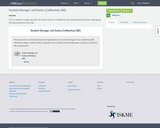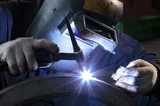
Article describes work and personal management techniques to help achieve work-life-balance
- Subject:
- Career and Technical Education
- Material Type:
- Reading
- Reference Material
- Author:
- David Lavenda
- Date Added:
- 05/23/2018

Article describes work and personal management techniques to help achieve work-life-balance

This lesson is designed to follow the Intermediate SAEs:The Next Step. The objective is to continue to move students through the research and development of their Foundational Career SAE. The students will continue to work on their Foundational SAE project based on their career interest, but research topics at the advanced level. The teacher may choose to only use the Foundational SAE project or they can also include an immersion SAE project that students keep track of their time, income and expenses over the course of the class. The students will participate in weekly assignments for their Foundational SAE and if they are completing an immersion SAE they will keep track of their hours each week. Starting SAE projects in the classroom should be simple for the teacher and students. Minimum expectations that can still produce success for all students would be tracking 1-hour of SAE time per week, exploring one career topic per week, and recording one financial entry per month. A final report or project at the end of the class would also be a minimum expectation for all students.

Taught in Spanish, for students interested in exploring a variety of careers and are:- dual language immersion learners- Spanish language learners who completed AP Spanish - New arrivals who speak Spanish- Heritage language learners Assessment: formative & summative assessments around the various modes of communication: Interpersonal, Presentational, and InterpretiveStudent centered, with lots of time built in for independent exploration, sharing with groups, guest speakers, and site visits in preparation for a career post graduation and pathway to accomplish their goals.Linked to Career or World Language Standards and overlap with business and IT standards. Students will be meeting many different objectives in their coursework. Additionally, participation in this class may help students understand the relevance of their other course preparations and how those subjects contribute to career readiness.

This lesson is designed to help students move from their Foundational SAE to an Immersion SAE. The students will continue to work on their Foundational SAE project based on their career interest, but they will also be introduced to Immersion SAEs. The teacher may choose to only use the Foundational SAE project to get started, but they should work toward helping their students move their SAE project to include one or more Immersion SAE projects. The students will participate in weekly Immersion SAE record keeping. Starting SAE projects in the classroom should be simple for the teacher and students. Minimum expectations that can still produce success for all students would be tracking 1-hour of SAE time per week, exploring one career topic per week, and recording one financial entry per month. A final report or project at the end of the class would also be a minimum expectation for all students. Over time the students expectations for their Immersion SAE projects can be expanded to include more record keeping and financial entries.

This is a student manager job duties document used for a coffeeshop style school based enterprise to help guide the daily operations of the SBE.

The Welding Fabrication & Robotics Associate Degree program prepares learners to program and operate CNC cutting and forming equipment, as well as robotic welders, and develops the skills needed to work in an advanced metal manufacturing environment. Learners also expand their print reading skills through fabrication layout, fixturing, and precision measurement. Welding metallurgy and machine shop principles are also studied. Critical thinking skills are built through problem-solving activities that foster teamwork, positive attitudes, and an understanding of global competition.